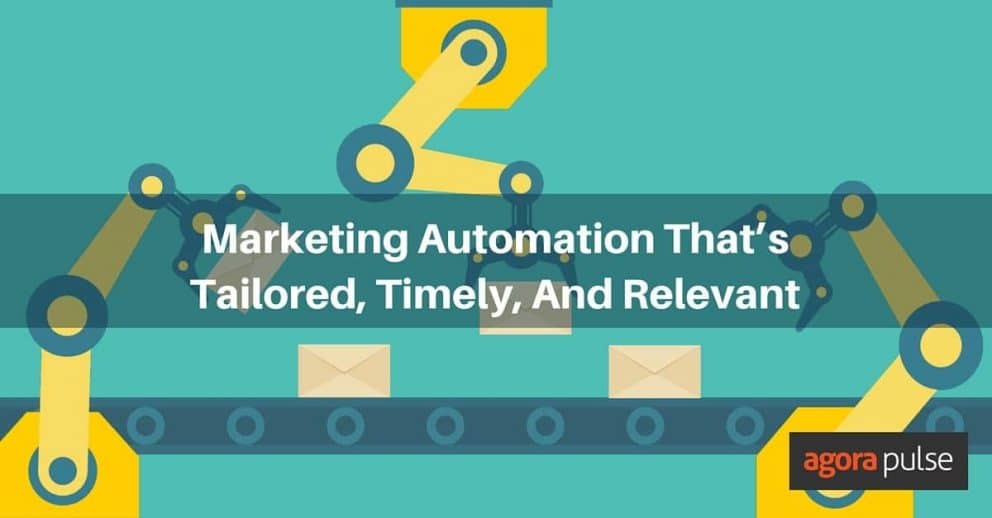EDITOR’S NOTE: The following post is from guest blogger Lilach Bullock.
Automated marketing. It sounds too good to be true, doesn’t it?
Indeed, many still believe that it is.
After all, the promise automated marketing makes is to allow marketing professionals to specify criteria and outcomes for certain tasks and processes, which specialist software then interprets, stores, and executes.
This, theoretically, leaves marketers with more time to spend on higher level tasks such as strategy, planning, and analysis, as well as improving efficiency and reducing the likelihood of human error.
It sounds like a marketing professional’s utopia. So why does automated marketing, amongst some groups, have such a bad name?
Related Post: Social Media Marketing
Why marketing automation got a bad name
When automated marketing first hit the industry years ago (at first focusing on email marketing automation alone), these tools were limited in their capacity and, as such, often achieved poor results.
Indeed, automated marketing tools became known for, at best, poorly targeted campaigns and, at worst, spam.
Many of the issues customers had with automated email marketing stemmed from three main aggravations: poor opt-in/out practices; a dislike of the use of images in advertising emails; and poorly executed, impersonal messages.
Indeed, as recently as 2010, Smart Insights wrote a post detailing the critical factors for email marketing success, and the recurring issue that was highlighted was the need to be relevant and targeted, and for the email to therefore meet the need of the recipients.
However, now we’re at a point where the industry has learned enough, and the technology has been developed sufficiently so as to allow for more nuanced, intelligent, automated campaigns that are able to avoid many of these problems.
So, whilst in some circles automated marketing may still have a bad name, there’s good reason to believe that this should no longer be the case.
And this turnaround couldn’t have come at a better time. Of course, since social media marketing erupted a few years ago, today’s marketers face an ever-growing list of arduous low-level tasks and chores – writing posts, updating statuses, responding to messages, and so on.
Why marketing automation is coming of age
It shouldn’t come as a surprise, then, that according to this marketing automation report from emailtoday:
- Nearly 11 times more B2B organizations are using marketing automation than in 2011.
- Best-in-class companies are 67 percent more likely to use a marketing automation platform.
- Sixty-three percent of companies successfully using automated marketing plan to increase their marketing automation budget.
- Seventy-nine percent of top-performing companies have been using marketing automation for more than two years.
- Ten percent of automated marketing users find it inexpensive; 47 percent believe it’s fairly priced; 22 percent find it pricey but worth it; and only 11 percent believe it’s too expensive.
- Twenty-five percent of Fortune 500 companies have adopted automated marketing.
[Tweet “In the past 5 years, 11 times more B2Bs have begun to use marketing automation. Here’s why.”]
So it’s clear that automated marketing is becoming more popular. And, looking at the benefits emailmonday.com lists, it’s easy to see why:
- Eighty percent of marketers found that the number of leads they generate increase.
- Seventy percent saw the number of conversions increase.
- Seventy-four percent claim that it saves them time.
- Sixty-eight percent believe that it increases customer engagement.
- Fifty-eight percent believe that it allows for more timely communications.
- Fifty-eight percent believe that it increases the opportunities for up-selling.
- Sixty-seven percent of B2B marketers witnessed at least a ten percent increase in sales opportunities, and 15 percent saw sales opportunities increase by 30 percent or more.
- The most successful marketing automation performers have an average of 60 percent higher lead-to-sale conversion rating.
The fact is that, as marketing automation tools get better and better, more organizations are choosing to adopt them, which allows the tool providers to invest in more technological developments which in turn make them even better still – and capable of achieving even better results for their users. As it stands, the marketing automation industry is worth $1.62 billion per annum; it is expected to reach $1.9 billion by 2020!
As the industry has grown, marketing automation has become able to effectively aid marketers with:
- Email Marketing (of course) – By enabling users to create newsletters and one-off campaigns, as well as more sophisticated campaigns that react appropriately to their recipient’s response, automated email marketing is not what it was even a few years ago. Now, many of these tools have design, data collection, data transfer, and analytics functionalities, making them a bona fide one-stop-shop for email marketing. GetResponse’s tool, Autoresponders 2.0, is a great example of this next generation approach to automated email marketing.
- Landing Page Creation – By allowing marketers to direct leads to a specific page tailored to their interests, landing pages have more than earned their place in the canny marketer’s arsenal. Even President Obama uses landing pages, and reportedly raised an additional $60 million for his last presidential campaign using A/B testing. With their ability to lower bounce rates, increase downloads, and direct customers to the most appropriate information or content, landing pages aren’t going anywhere soon.
- Lead Management – By helping companies effectively generate and manage new leads, lead management tools can, in a very real way, help businesses increase sales and revenue. In general, businesses using lead management software benefit from a far more ordered structure for managing business inquiries and leads. Some of the best solutions are Pipedrive, Leadbyte, and Teamgate.
- Customer Relationship Management – The direct successor of lead management, customer relationship management gives businesses the opportunity to manage, analyse and gain data on their interactions with customers. Using this information, these businesses are then able to improve their relationships with customers, increase acquisition, and improve retention. Zoho CRM, Nutshell, and Apptivo are some of the leaders in this sub-market.
Whilst the above lists some of marketers’ favorite uses of automated marketing tools, there are plenty of other marketing automation tools out there – and some offer incredibly bespoke functions. In fact, if you can think of an area of marketing that would benefit from some level of automation, there’s a good chance that there’s a tool that does it.
Benefits of marketing automation
Using one or more marketing automation techniques, marketers can benefit from a higher volume and quality of leads, accelerated growth of qualified leads entering the sales tunnel, and huge gains in time (and thus money). Combined, these advantages translate into a far more effective marketing department and significantly improved business.
The question now is not whether automated marketing is effective; but which businesses are going to use it to their advantage and which are not. If you’re reading this article, then the chances are that I’m preaching to the converted (since you’ve already displayed an interest in the topic). However, if you’re still umming and ahhing about marketing automation, I’d strongly advise you to take it seriously: as online business continues to grow, those companies which invest in excellent marketing automation solutions and structures are likely to break away from the rest.
Are you using automated marketing? If so, what are some of your favorite functionalities and tools? If not, why? Let us know in the comments!
ABOUT OUR GUEST BLOGGER: Highly regarded on the world speaker circuit, Lilach Bullock has graced Forbes and Number 10 Downing Street. She’s a hugely connected and highly influential entrepreneur. Liilach has been named by Forbes as one of the top 20 women social media power influencers and was crowned the Social Influencer of Europe by Oracle.




